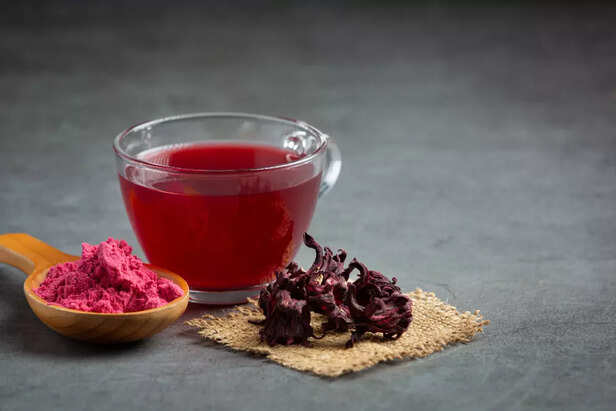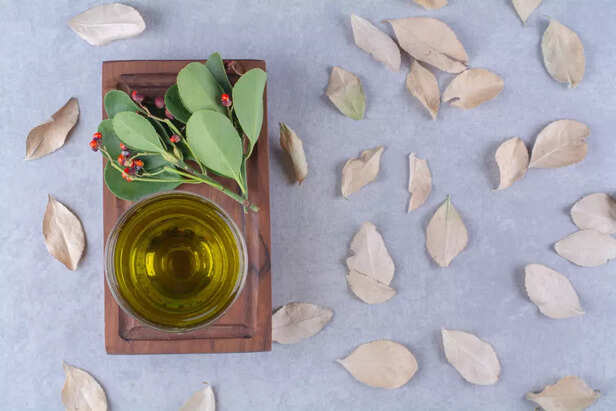Three Best Herbal Oils For Hair — Make Them At Home Easily
Ushnish Samadder | May 21, 2025, 08:00 IST
( Image credit : Freepik, Timeslife )
The appropriate oil for hair treatment must be chosen, as herbal oils are not suitable for all types of hair. Hair can be oily, dry, curly, or straight, and scalp conditions are the same. Commercial herbal oils have preservatives, coloring, or diluted extracts, and using them can lead to irritation or greasiness of the scalp. Rather than reaching for commercial products, creating your own herbal oil from home allows you total control over ingredients, and that means you can customize it to your hair's exact requirements — providing safer, better results.
You’ve tried everything to bring life back to your dry, lifeless hair. From endless internet searches to collecting tips from friends and coworkers, you’ve experimented with all sorts of treatments that promise soft, healthy locks. But despite your efforts, the results are often disappointing.
Oiling your hair before bed is a popular routine, especially for those looking to nourish and soften their strands overnight. However, one important factor often gets overlooked: the type of oil you use. Not every oil is suitable for every hair type. In fact, some oils might even weigh your hair down or cause scalp issues if they don’t suit your needs.
Herbal oils have earned a reputation for being natural, gentle, and effective for promoting hair health. But here’s the catch — many store-bought “herbal” oils are loaded with synthetic additives or might not contain the herbs in effective concentrations. That’s why making your own herbal hair oil at home can be a game-changer. It's simple, customizable, and most importantly, you know exactly what’s going into it.
For Dry Hair-
Coconut oil is your best friend. If your hair is extremely dry or you're struggling with split ends, this oil can help restore moisture and shine.
For Dry Hair with Dandruff-
Rosemary oil is a natural remedy for scalp issues. Mix a few drops of rosemary essential oil with your regular carrier oil to improve scalp health and reduce flaking.
For Thinning Hair or Hair Fall-
Castor oil is rich in ricinolein acid, which boosts circulation and supports hair growth. It won’t work overnight, but consistent use over three months can bring visible improvement.
Which oil can you make at home?
Amla is a traditional remedy that strengthens hair follicles, promotes growth, and prevents premature greying. A classic and effective combination, coconut oil infused with amla is known to promote hair growth, strengthen roots, and prevent premature greying.
Apply 2–3 times a week. Massage into the scalp and hair length, leave for a few hours (or overnight), then wash.
Hibiscus petals are rich in amino acids that nourish hair, while fenugreek seeds help reduce dandruff and hair fall.

Massage warm oil into your scalp 3 times a week. Leave it on for at least an hour before washing.
Castor oil strengthens hair roots and encourages growth, while curry leaves contain antioxidants and amino acids that prevent thinning.

Mix 2 teaspoons of castor oil with 3 teaspoons of coconut oil.
Add a handful of fresh curry leaves.
Boil until the mixture thickens slightly and leaves turn crisp.
Let it cool and store in a jar.
Use this oil 2–3 times a week. Warm it up slightly, massage into your scalp, and leave it on for a few hours before washing.
Explore the latest trends and tips in Health & Fitness, Travel, Life Hacks, Fashion & Beauty, and Relationships at Times Life!
Oiling your hair before bed is a popular routine, especially for those looking to nourish and soften their strands overnight. However, one important factor often gets overlooked: the type of oil you use. Not every oil is suitable for every hair type. In fact, some oils might even weigh your hair down or cause scalp issues if they don’t suit your needs.
Herbal oils have earned a reputation for being natural, gentle, and effective for promoting hair health. But here’s the catch — many store-bought “herbal” oils are loaded with synthetic additives or might not contain the herbs in effective concentrations. That’s why making your own herbal hair oil at home can be a game-changer. It's simple, customizable, and most importantly, you know exactly what’s going into it.
Which oils are good for your hair?
Coconut oil is your best friend. If your hair is extremely dry or you're struggling with split ends, this oil can help restore moisture and shine.
For Dry Hair with Dandruff-
Rosemary oil is a natural remedy for scalp issues. Mix a few drops of rosemary essential oil with your regular carrier oil to improve scalp health and reduce flaking.
For Thinning Hair or Hair Fall-
Castor oil is rich in ricinolein acid, which boosts circulation and supports hair growth. It won’t work overnight, but consistent use over three months can bring visible improvement.
Which oil can you make at home?
Coconut oil with Amla (Indian Gooseberry)
Why it works:
How to make it:
- Take 1 cup of coconut oil.
- Add 2 tablespoons of amla powder or a few pieces of dried amla.
- Boil the mixture on low flame until the oil changes color.
- Let it cool, strain if needed, and store in a glass bottle.
How to use:
Hibiscus with Fenugreek
Why it works:

Hibiscus with Fenugreek
( Image credit : Freepik )
How to make it:
- Take petals from 5 hibiscus flowers.
- Add 1 teaspoon of fenugreek seeds.
- Boil them in a carrier oil (like coconut or sesame) until the oil thickens.
- Cool and store.
How to use:
Curry Leaves with Castor Oil
Why it works:

Curry Leaves with Castor Oil
( Image credit : Freepik )
How to make it:
Add a handful of fresh curry leaves.
Boil until the mixture thickens slightly and leaves turn crisp.
Let it cool and store in a jar.
How to use:
Explore the latest trends and tips in Health & Fitness, Travel, Life Hacks, Fashion & Beauty, and Relationships at Times Life!
